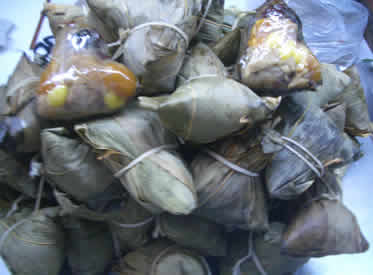 Image Source: Dragon Boat Racing by Mr WabuLicense
Image Source: Dragon Boat Racing by Mr WabuLicense
This is another post I wrote a little while ago and haven’t posted until now.
China’s Dragon Boat Festival (Duanwu) occurs on 5th May on the Lunar calendar. This equates to the following dates on the Western calendar:
- 2012 date: 23 June
- 2013 date: 12 June
As the name of the Festival indicates, it’s famous for Dragon Boat racing! People also eat zongzi (glutinous rice dumplings wrapped in bamboo leaves) and drink baijiu (Chinese wine) during this holiday.
Origins Of The Dragon Boat Festival
There are many stories about the origins of the Dragon Boat Festival. I’ve heard some first-hand and read others on the Internet, but all agree that the day commemorates Qu Yuan, a famous Chinese poet and minister several thousand years ago.
Qu Yuan committed suicide by drowning himself in the Miluo river in Hunan. The reasons given for this act vary, from story to story, but all agree that drowning was the method.
It’s said that the local people threw zongzi into the river to feed the fish, so they wouldn’t eat Qu Yuan’s body, and paddled their ‘dragon boats’ out to scare the fish away. The Dragon Boat Festival recreates this.
Dragon Boat Festival Now A Public Holiday
This is the first year, in recent times, where the Dragon Boat Festival has been awarded the status of national public holiday.
Because there hadn’t been a day off, the festival had been losing it’s importance in modern Chinese life. Most people had to work over the festival and didn’t have time to celebrate it properly.
The China People’s Daily carries an article discussing this (and the origins of the Dragon Boat Festival). It highlights this through the story of a young Beijing office worker:
She only learned about the festival from school textbooks and in her more than 20 years of life, she never celebrated such an occasion except by eating zongzi bought from the supermarket.
But this year, she made the zongzi together with her friends. “We have time this year due to the holiday,” she said.
It also discusses the decision to make the day a national holiday:
On Dec. 16, the State Council, China’s Cabinet, revised the nation’s official holiday schedule to add three traditional festivals — “Tomb-Sweeping Day,” “Dragon Boat Festival” and “Mid-Autumn Festival” — in response to public demand. It also changed the length of other holidays.
What this doesn’t say is that the real reason for the change in holiday dates is to avoid the chaos created by the Golden Week holidays. The May and October Golden Weeks no longer exist. Chunyun will still exist around Spring Festivals – there’s no way that can be removed.
When they were looking at how they could rearrange the Golden Week holidays, the obvious choice was to move the days to the traditional festivals.
For foreigners working in China, this does mean you get a smattering of days off, sometimes in mid-week, instead of a week off, but it’s an excellent chance to experience occasions such as the Dragon Boat Festival.
In any case, the week off was complicated by the fact that there were only 3 holiday days. Chinese workers were expected to work on Saturday and Sunday to make up the two days. In some cases, I’ve had to work the Saturday and Sunday, in other cases I didn’t have to work, but was docked two days pay. I’ve even been given the extra two days off as paid holidays!
All in all, I think this is a good move, which will promote these festivals, which were slowly fading in the face of modernisation.
Zongzi
Zongzi are pyramid shaped glutinous rice dumplings, wrapped in bamboo leaves. They contain different fillings: everything from pork to bean paste. I like zongzi, but not too often – I’m not a huge fan of glutinous rice. They’re very filling, perhaps too much so. Glutinous rice is very heavy food.

While reading about the Dragon Boat Festival, I came across an article from The China People’s Daily that has more information about Zongzi:
Southerners generally wrap them in bamboo leaves, while northerners use reeds. They are generally pyramid shaped, but sometimes molded into rectangles.
It goes on to talk more about the fillings:
Fillings also vary. People from North China typically stuff their dumplings with glutinous rice and Chinese jujube, while those from South China cram theirs with pork and mashed red beans.
It also mentions that certain areas specialise in certain types of zongzi:
Jiaxing in Zhejiang province, for example, makes the best zongzi with fresh pork stuffing, while Shanghai is famous for ham-stuffed zongzi.
I haven’t tried either of these, but I used to live in Zhaoqing (Guangdong) which is also famous for it’s zongzi:
A special food is only available here called “guo zheng zong” , a kind of Zongzi which is made of meat ,green bean,and glutinous rice. My advice is to devour one before you leave.
It’s my belief that they actually use lotus leaf in Zhaoqing, but I can’t be certain of that. They’re certainly common, cheap and delicious and available all year round, not just during the Dragon Boat Festival.
If you ever travel to China, make sure you try the zongzi.
That Zongzi looks good. It’s one of my favorite foods. We only have to once or twice a year. If you eat too much, it will kill you… 🙂 Just kidding.
It’s weird that I am reading more about Chinese on English blog. 🙂
Keep it up!